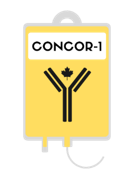COVID-19 and transfusion medicine
This repository aims to support Canadian transfusion medicine health care professionals during the COVID-19 pandemic. It will be updated regularly as new information is available. In addition, the public and donors can learn more about how Canadian Blood Services is responding to COVID-19 by visiting blood.ca/covid-19.
Blood products inventory management
The National Emergency Blood Management Committee meets regularly to review the supply of blood components and products during the pandemic and make inventory advisories.
View all inventory advisories at blood.ca: https://www.blood.ca/en/hospital-services/customer-service/communications/inventory-advisories.
Why getting a COVID-19 vaccine shouldn't stop you from donating blood. Individuals who have been vaccinated with any of the COVID-19 vaccines approved for use in Canada are still eligible to donate blood. To find out more about how Canadian Blood Services made this decision to not defer donors who have been vaccinated, read our blog post.
Resources for blood product conservation practices during COVID-19
Blood shortages planning in Canada: The National Emergency Blood Management Committee experience during the first 6 months of the COVID-19 pandemic, published September 7, 2021 in Transfusion.
National Blood Shortage Contingency Planning During a Pandemic: Hospital Transfusion Medicine Laboratory (TML) Checklist and Considerations” published by National Advisory Committee on Blood and Blood Products
National Plan for Management of Shortages - Summary for Blood Banks published by Canadian Blood Services on March 20, 2020)
ONTraC Program - Patient Blood Management Resources published by Ontario Transfusion Coordinators.
Blood Conservation in the Time of COVID-19 Poster published by Choosing Wisely Canada.
Pandemic Preparedness - Blood Utilization Poster.
Choosing Wisely COVID-19 recommendations (recommendations #7 and 9 for clinicians) published by Choosing Wisely Canada.
FAQ: SARS-CoV-2 Antibodies in Immunoglobulin Products
In the past few months, Canadian Blood Services has received several inquiries from physicians asking about data on SARS-CoV-2 binding and neutralizing antibodies in plasma-derived immunoglobulin products. This FAQ shares available evidence about SARS-CoV-2 antibodies in immunoglobulin products and includes information provided by immunoglobulin suppliers.
FAQ: Information for health professionals on safety of transfused blood collected from COVID-19-vaccinated donors
Patients may have concerns related to the safety of transfused blood or blood products collected from donors who have received a COVID-19 vaccine. If your patients have these concerns, our FAQ for health professionals may help you in informing their decision making. Information on this topic for the public can be found on Canadian Blood Services’ website at COVID-19 vaccines and blood donation.
FAQ for health professionals working with blood products
Health-care workers who handle fresh blood components from Canadian Blood Services (i.e., red blood cells, platelets, plasma) may have questions about whether accidental exposure to these products puts them at risk for COVID-19. Read our FAQ that summarizes evidence supporting the view that the SARS-CoV-2 virus is not transmitted through blood and also provides links to other related guidance documents.
Impact of COVID-19 on blood donations
To find out how COVID-19 has affected blood donations in Canada, read this Canadian Blood Services publication.
Hospital-based transfusion services during COVID-19
Effects of the COVID-19 pandemic on supply and use of blood for transfusion: Stanworth et al. (July 2020, The Lancet Haematology). COVID-19 has brought major implications for blood transfusion practices: uncertain demand patterns, reduced donations and loss of staff. This paper synthesizes studies that address the transfusion chain and provide guidance during times of potential or actual shortage. Dr. Mindy Goldman, Medical Director at Canadian Blood Services, is one of the study’s authors. For more about the study, visit the R.E.D. blog.
An article by Yazer et al. (May 2020, Vox Sanguinis) surveyed 12 centres from around the world (including Canada) about how hospital-based transfusion services have responded during COVID-19, including sample handling, pre-transfusion testing and issuing of blood products. See Table 2 in the article for a summary of respondents’ answers.
Convalescent plasma
All three national clinical trials examining COVID-19 convalescent plasma as a potential treatment option for COVID-19 patients (CONCOR-1, CONCOR-KIDs, REMAP-CAP) have discontinued patient enrolment. On Friday, January 29, 2021, the CONCOR-1 trial's independent data safety monitoring committee determined that the study is unlikely to demonstrate a benefit of convalescent plasma even if more patients are enrolled. The CONCOR-1 study team is in the process of completing the follow-up data for all enrolled patients and will release the final study results once the complete data set is available.
To learn more about Canadian Blood Services’ contributions to CONCOR-1 see below.
- February 3, 2021: Canadian Blood Services suspends convalescent plasma collection following decision by study team to stop patient enrolment.
- April 16, 2020: Canadian Blood Services Chief Scientist, Dana Devine spoke with The Agenda to discuss the clinical trial.
- April 2, 2020: Canadian Blood Services announces that it is actively working with Health Canada and the international research community as part of a global effort to determine if convalescent plasma could effectively treat COVID-19. Canadian Blood Services will contribute by collecting and preparing plasma from fully recovered COVID-19 patients. Canadian physicians caring for patients with COVID-19 will have access to the convalescent plasma in the context of the clinical trial.
- March 31, 2020: The National Advisory Committee on Blood and Blood Products published a “Fact Sheet on Convalescent Plasma and Intravenous Immune Globulin (IVIG) for Treatment of COVID-19 in Canada”.
- March 30, 2020: Transfusion News article on convalescent plasma.
- May 28, 2022: Lessons learned from the Concor-1 trial published in Transfusion Medicine.
Additional information
- Government of Canada: Clinical management of patients with moderate to severe COVID-19 - Interim guidance
- Canadian Blood Services: COVID-19 information for the public
- Public Health Agency of Canada: Coronavirus disease (COVID-19): Outbreak update
- WHO: Coronavirus disease (COVID-19) Pandemic
